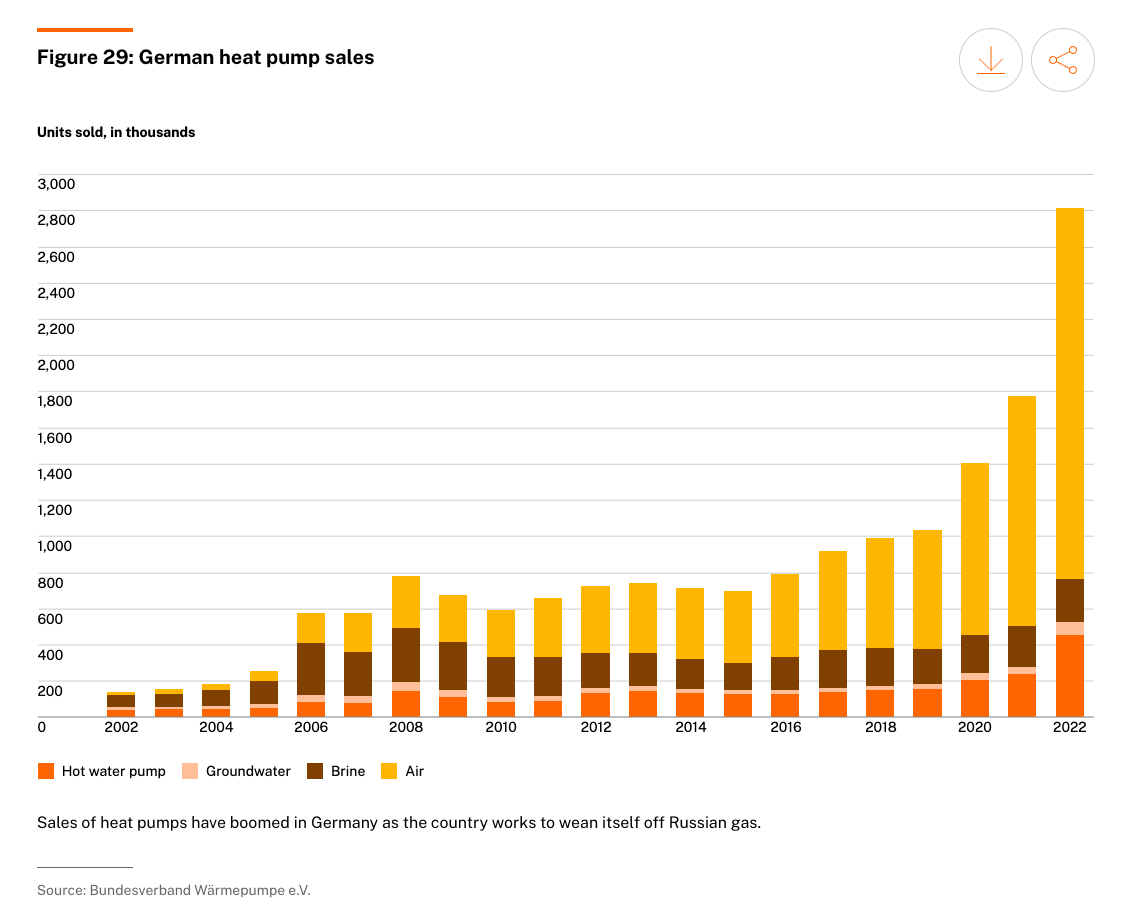Hamish went to the Octopus Energy Tech Summit yesterday in London (see his takeaways here). As a result, we take another look at heat pumps this week, inspired by this Bessemer post.
101 on Heatpumps 🗞️
Heating and cooling constitute half of the world's energy consumption, with a market size of over $1.4 trillion. To combat carbon emissions in this massive industry, we need diverse solutions, including thermal energy storage, nuclear energy, geothermal energy, green hydrogen, and heat pumps.
Heat pumps offer a renewable alternative to traditional boilers and furnaces. They efficiently transfer heat from one location to another, outperforming boilers that burn fossil fuels.
In detail, heat pumps use minimal electricity to extract heat from low-temperature sources (air, water, or ground) into a refrigerant fluid. As the fluid heats up and becomes a gas, it's compressed, further heating it before distributing it where needed. This reversible process allows heat pumps to both heat and cool spaces.
Amid the global push for net-zero carbon emissions by 2050, heat pumps could reduce CO2 emissions by 500 million metric tons in 2030, equivalent to Europe's annual car emissions. This is what Germany’s deployment looks like, for context.
Current Heat Pump Usage:
Homes and industries increasingly adopt heat pumps to replace fossil fuel-based systems.
By 2050, around 2.6 billion people may rely on heat pumps for heating and cooling.
Single-family homes install a few heat pumps, while apartments and multi-family buildings use centralized HVAC systems.
Industrial applications include recovering waste heat for various processes.
Factors Driving Heat Pump Adoption:
Energy Crisis and Price Trends: Heat pump demand is tied to energy prices; they become more attractive as electricity prices drop relative to gas prices.
Policy Support: Government incentives, like tax credits and energy efficiency regulations, encourage heat pump adoption.
Consumer Awareness: Growing sustainability awareness fuels interest in heat pumps.
Opportunities in the Heat Pump Value Chain:
Heat Pump OEMs: Innovations are making heat pumps smaller, cheaper, and more modular, addressing challenges in retrofitting older buildings and factories.
Installation and Financing: Simplifying installation processes and offering financing options can make heat pumps more accessible.
Operations and Maintenance: Enhanced software solutions help monitor and optimize HVAC systems, ensuring efficiency and reducing emissions.
A Future with More Heat Pumps: To decarbonize global heating and cooling, we need a multifaceted approach. Heat pumps, especially those suited for low-to-medium temperature applications, offer a promising solution. Other technologies like hydrogen and thermal storage are also on the horizon, contributing to the transition to sustainable heating and cooling systems. While some innovations may remain in R&D, the journey towards commercialization is promising.
Week in Impact Articles ✍🏽
Monday: Data shows customer acquisition is getting tougher for Europe’s consumer fintechs
Tuesday: Amazon launches seller sustainability hub and makes first direct air capture investments
Wednesday: Opinion: despite von der Leyen’s reassuring words, the EU Green Deal is in trouble
Thursday: Intermountain, UPMC switching from Oracle Health's Cerner EHR to Epic enterprisewide
Friday: Hope for the UK clinical trial landscape but it requires a lot of work
3 Key Charts 📊
1. Noticeable differences in educational outcomes
2. Heatpump installation for dummies
3. Latest figures on the two largest solar markets
Deal Capture 💰
Deals in the impact space across the UK and Europe
Charac
Pharma startup Charac raised £1.2m.
Cleverly
Edtech startup Cleverly raised E8.6m.
Kuano
Quantum simulation platform Kuano raised £1.8m.
Treefera
Nature-based analytics Treefera raised $2.2m.
Viboo
Energytech startup Viboo raised E1.6m.
Vida
ESG management softawre VIDA raised E3m.
Getting in Touch 👋.
If you’re looking for funding, you can get in touch here.
Don’t be shy, get in touch on LinkedIn or on our Website 🎉.
We are open to feedback: let us know what more you’d like to hear about 💪.







